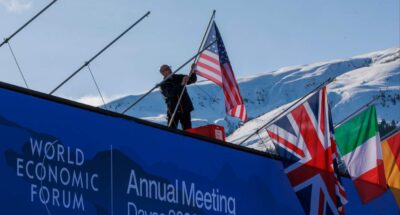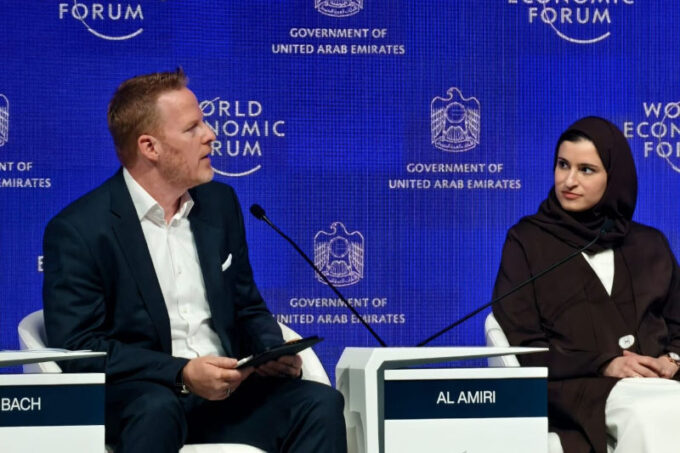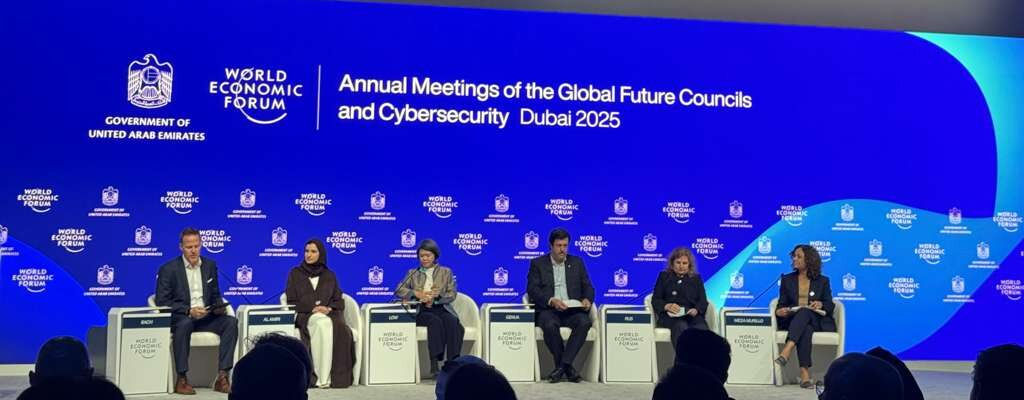
Geopolitics dominates Davos: Values-based pragmatism as a blueprint for action
From Trump and transatlantic tensions to AI’s reality check and sustainability’s reinvention, Davos 2026 signals a shift toward values-based pragmatism....

by David Bach, Simon J. Evenett, Stéphane J. G. Girod, Öykü Işık, Vanina Farber Published October 17, 2025 in Geopolitics • 8 min read
Global leaders descended on Dubai this week for the World Economic Forum’s Annual Meetings of the Global Future Councils and Cybersecurity. They did so against the backdrop of global challenges that are piled high.
Those include geopolitical flashpoints, trade conflicts, and a growing distrust among the economic behemoths – principally the US and China – that is playing out in tariff wars. It was also highlighted that humanity must address its “abyss of ignorance” and live within the nine planetary boundaries.
Those rupture points are real. But what also emerged, from the plenaries and the corridors and hotels of the global gathering in the UAE’s sweltering and largest city, was a shared optimism and hope for a future that looks brighter than the present. A sense of optimism filled the air in Dubai.
The various councils that pore over topics ranging from global trade to cybersecurity and humanitarian aid placed a sharp emphasis on action. The result was a slew of solutions to, among other things, sustain momentum on sustainability amid political attacks and harness the value of nature as capital.
The sessions, some led by IMD faculty, also came forth with recommendations to guide the use of technologies like AI through strong governance and ethics. And there was a rallying call to boost global collaboration in building systems of health, finance, and aid that support both shared prosperity and global stability.
Here are five of IMD faculty’s key takeaways from the three days in Dubai:

– David Bach, President of IMD, Nestlé Professor of Strategy and Political Economy
This year’s gathering started with World Economic Forum President Børge Brende describing the challenges of the moment: geopolitical tensions, trade conflicts, uncertainty over the direction of rapidly changing technology, and a planet in peril.
And yet, after the conversations I was fortunate to attend, I personally feel a great deal of optimism. That sense of possibility resonated in the closing plenary I moderated, where we reflected on the actions that we all must take to seize the opportunities of this moment.
The role of governments, in strengthening our communities and our planet, came through strongly. In Argentina, we heard about efforts to bring together talent, business, and supportive public policy to drive innovation. In contrast to Europe where there’s a scarcity of optimism, we heard that, in the UAE, education is being used to prepare the next generation to seize opportunity.
One way to do that is by treating nature as capital – and using science, technology, and policy to address the challenges that Brende outlined in his opening address. So, it is not just that change is happening to us; we can create the conditions for new opportunities to present themselves.
That spirit of agency shaped the closing moments, when we asked the audience: what gives you hope that we can address the challenges that are before us? For me, it was the shared optimism and belief that the future is very much in our own hands.

– Simon J Evenett, Professor of Geopolitics and Strategy
What struck me in the Global Future Council on International Trade and Investment was how far the world has moved from the old trade order – and how raw power has displaced rules.
Once, discipline was enforced through the World Trade Organization. Governments that broke the rules could be taken to Geneva and induced to change course. But that system has broken down. Now, in a climate of geopolitical rivalry and growing distrust, trade policy is being shaped by something else: leverage.
Rather than lawsuits, many big economies now use threats: to restrict exports of rare earths, or withhold access to their markets. The rules have become norms, which are broken all too often by the economic behemoths. Many other governments follow them not because they must, but because they choose to.
Companies are adapting to this new world order. Some, for instance, are redesigning products to contain fewer sensitive components sourced from geopolitical flashpoints. That will reshape manufacturing footprints, with certain countries – Switzerland among them – likely to benefit.
While the US has escalated tariffs, most governments have shown restraint. The risk of global protectionism remains, but it is mostly sector-specific: steel, semiconductors, and certain electronics.
At the same time, digital trade is surging – much of it services-related. The UK, for one, now exports more services than goods. This points to the next frontier of trade and investment: data governance and digital economy agreements. Some countries are already moving fast to define these new standards.
All this is to say that trade is changing under the influence of geopolitics. It is not in retreat. A new chapter of the history of globalization is being written.

“Trade is changing under the influence of geopolitics. It is not in retreat. A new chapter of the history of globalization is being written. ”
– Stéphane Girod, Professor of Strategy and Organizational Innovation
A recurring theme across the discussions was the contradiction between seemingly incompatible objectives and targets.
That tension came through strongly in the words of Sylvia Earle, former chief scientist of the US National Oceanic and Atmospheric Administration, who reminded us that nature is our most precious thing. Mankind now has a final chance to protect its environment and confront its abyss of ignorance. We must learn to live within our planetary boundaries – what Earle called our “safe operating space that makes Earth special”.
Her call to respect planetary limits was followed by a speaker from the UAE, who spoke about how bold vision and decisive leadership can turn ambition into reality – citing Dubai’s development as an example. The same conviction is needed now to make nature part of how our economies create value.
That same question guided our work in the Lifestyle and Experience Economy Council, where we brought together experts from heritage, tourism, real estate, and luxury. These sectors face multiple rupture points. By 2035, museums face the potential displacement of value to big tech; luxury must keep its social license to operate in a polarized world; and tourism needs to overcome the downsides of overtourism.
Different as they are, these industries must all focus on creating a positive impact for people, the planet, and society. I believe they must also consider the countryside, and not just cities. A recent McKinsey report highlighted the economic potential of investing in rural America. Much of today’s social unrest is fuelled by the neglect of rural and village communities.
One of the core ideas we explored was treating cybersecurity as a global commons – something we all rely on and must collectively protect.
– Öykü Işık, Professor of Digital Strategy and Cybersecurity
This year’s Annual Meeting on Cybersecurity, held alongside the Global Future Councils, felt different. The conversations did not stay in the technical weeds. There was a real appetite to explore the bigger picture. That is, the economics, governance, and human behavior behind cyber risk.
I facilitated a session on the financial dimensions of cybersecurity. We know breaches come at a cost, but what’s still missing are clear frameworks to understand the full financial impact, especially when it comes to supply chain breaches. In the session, we tried to map what matters: what factors actually shape the financial impact of a breach? How do we get organizations to invest more in long-term protection? What kinds of incentives would help?
As co-chair of the Global Future Council on Cybersecurity, I had the chance to reflect with an incredibly diverse group of diplomats, academics, policymakers, engineers, and lawyers. What struck me was that almost no one had formally studied cybersecurity. And maybe that’s the beauty of it: to push the field forward, we need to get out of our self-imposed boundaries and stop seeing cybersecurity as just a technical challenge.
One of the core ideas we explored was treating cybersecurity as a global commons – something we all rely on and must collectively protect. Could it be framed like climate, or space, or public health? Should it be a shared service, like a utility? Could we imagine a World Health Organization-equivalent for cyber, setting minimum standards above national boundaries?
That matters because in cybersecurity one person’s weakness affects the whole ecosystem. Raising the floor for some raises it for all. The goal now is to elevate cybersecurity beyond digital transformation, and into a shared global responsibility.

We are not just exchanging perspectives. Together, we are building momentum for change.
– Vanina Farber, elea Professor for Social Innovation and Dean of the EMBA Program at IMD
My Global Future Council is focused on reimagining aid – and reimagining feels existential under the current global context.
The pace of the council’s work is relentless. Each discussion builds on the last, pushing from ideas to action. This is not a meeting where you listen politely and move on. You are expected to build, map partnerships, and name the next steps. The urgency in the room matches the uncertainty outside it.
And maybe that’s why meaningful exchanges happen in the margins. Over coffee and dates for example, a conversation between someone from humanitarian finance, and a member of the antimicrobial resistance council, draws in a gender parity specialist. The result is that we identify a funding gap no one has spotted before.
The serendipitous conversations in hot shuttle rides between venues become mobile brainstorming sessions. The corridors between sessions turn into laboratories for ideas that intersect different councils.
What stays with me most, though, are the people. We come together to talk about systems – aid, finance, climate, health, equity, trade, supply chains. But the conversations often become personal, with stories about why this work matters. And underneath it all is a sense that we are not just exchanging perspectives. Together, we are building momentum for change.

President of IMD and Nestlé Professor of Strategy and Political Economy
David Bach is President of IMD and Nestlé Professor of Strategy and Political Economy. He assumed the Presidency of IMD on 1 September 2024. He is working to broaden and deepen IMD’s global impact through learning innovation, excellence in degree- and executive programs, and applied thought leadership. Recognized globally as an innovator in management education, Bach previously served as IMD’s Dean of Innovation and Programs.

Professor of Geopolitics and Strategy at IMD
Simon J. Evenett is Professor of Geopolitics and Strategy at IMD and a leading expert on trade, investment, and global business dynamics. With nearly 30 years of experience, he has advised executives and guided students in navigating significant shifts in the global economy. In 2023, he was appointed Co-Chair of the World Economic Forum’s Global Future Council on Trade and Investment.
Evenett founded the St Gallen Endowment for Prosperity Through Trade, which oversees key initiatives like the Global Trade Alert and Digital Policy Alert. His research focuses on trade policy, geopolitical rivalry, and industrial policy, with over 250 publications. He has held academic positions at the University of St. Gallen, Oxford University, and Johns Hopkins University.

Professor of Strategy and Organizational Innovation
Stéphane J.G. Girod is Professor of Strategy and Organizational Innovation at IMD. His research, teaching and consulting interests center around agility at the strategy, organizational and leadership levels in response to disruption. At IMD, he is also Program Director of Reinventing Luxury Lab and Program Co-Director of Leading Digital Execution.

Professor of Digital Strategy and Cybersecurity at IMD
Öykü Işık is Professor of Digital Strategy and Cybersecurity at IMD, where she leads the Cybersecurity Risk and Strategy program and co-directs the Generative AI for Business Sprint. She is an expert on digital resilience and the ways in which disruptive technologies challenge our society and organizations. Named on the Thinkers50 Radar 2022 list of up-and-coming global thought leaders, she helps businesses to tackle cybersecurity, data privacy, and digital ethics challenges, and enables CEOs and other executives to understand these issues.

elea Professor of Social Innovation, IMD
Vanina Farber is an economist and political scientist specializing in social innovation, sustainability, impact investment and sustainable finance. She also has almost 20 years of teaching, researching and consultancy experience, working with academic institutions, multinational corporations, and international organizations. She is the holder of the elea Chair for Social Innovation and is the Program Director of IMD’s Executive MBA program and IMD’s Driving Innovative Finance for Impact program.

January 23, 2026 • by David Bach, Julia Binder, Arturo Bris, Frédéric Dalsace, Simon J. Evenett, Florian Hoos , Jennifer Jordan, Sara Ratti, Karl Schmedders, Sarah E. Toms, Ginka Toegel in Geopolitics
From Trump and transatlantic tensions to AI’s reality check and sustainability’s reinvention, Davos 2026 signals a shift toward values-based pragmatism....

January 16, 2026 • by José Caballero in Geopolitics
South Korea continues to invest heavily in science and technology, yet a climate of entrepreneurial decline envelops it. What takeaways are there across the board for leaders in other economies?...

January 12, 2026 • by Simon J. Evenett in Geopolitics
In turbulent times, companies can justify their investments in geopolitical assets by moving beyond risk mitigation and using foresight to gain competitive advantage and create value....

January 9, 2026 • by Jerry Davis in Geopolitics
The US President is gouging out chunks of America’s long-established economic data apparatus because he doesn’t like what he sees. It’s unlikely to end well....
 Audio available
Audio availableExplore first person business intelligence from top minds curated for a global executive audience